#001
Communication creates
sustainable shared
understandings
Yoko Hasebe
Japanese Color: WAKANAE-iro
#001
Yoko Hasebe
Japanese Color: WAKANAE-iro
MOVIE

Associate Professor
Faculty of Environment and Information Studies
In the distant African nation of Democratic Republic of the Congo (DR Congo), an elementary school has been built from the ground up to create a model for primary education in the country.
Under a long-term project on a remote island of Japan, sustainable ways to provide supportive collaboration to the community by harnessing the island’s unique heritage is being explored.
These are not volunteer projects. Rather, they are undertaking and putting into practice research on interlinguistic and intercultural communication.
Creating a sustainable relationship model through interlinguistic and intercultural collaboration is the research being undertaken by Associate Professor Yoko Hasebe.
My specialty is interlinguistic and intercultural communication based on English language education, and I am researching its curriculum design and teaching methods. Generally, when we think about intercultural communication, it is exchange with foreign countries that comes to mind. However, even when we are talking with Japanese people, a word can often be interpreted completely differently by the other person, due to individual understandings of the image evoked by that particular word that arises from our diverse backgrounds. Nevertheless, there is the mistaken impression that sharing a language or an interpretation equals understanding, and major communication gaps can arise before we know it.
My special field of research is the creation of environments for interlinguistic and intercultural communication that generate these kinds of “discoveries.” What steps are required, what kind of settings do we need to create, and what kind of program do we need to assemble? This involves developing a curriculum design, creating an environment that generates sustainable shared understandings as quickly and naturally as possible, and coming up with the methodology to teach the required content and language, for example. We are undertaking this research by putting these concepts into practice through specific projects.
The most typical project we are undertaking for interlinguistic and intercultural communication is the Congo Acadex Project. This project was started in 2008, originating with the wish of Simon Bedelo, the Part-time Lecturer in English at Keio University Shonan Fujisawa Campus (SFC), who is a native of DR Congo, to give back to his own country through education. Specifically, the project involves the construction and management of an elementary school in Kinbondo, located in the suburb of the capital, Kinshasa.
The project is occasionally mistaken for a volunteer aid project. However, this is pure research about interlinguistic and intercultural communication, and we see the project as the practice of relationship building, and mutual supportive collaboration with an eye to the future of both Japan and Africa. Since the project was launched, it has proceeded as a unified research project involving collaboration in 3 areas: architecture, for the construction of the school; education, for the design and implementation of teaching curriculum, and medicine, in terms of teaching the students about hygiene and improving their health.
Currently, around 240 students are enrolled at ACADEX Elementary School. We will provide stable school management as well as high-quality education by combining knowledge from Japan and DR Congo, and further promote the project to establish a sustainable model school that can provide a future template for the educational environment in DR Congo.
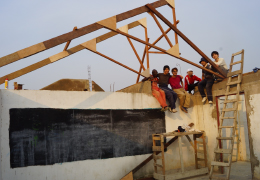
We collaborate with Hiroto Kobayashi Laboratory for building the school. The architecture team worked collaboratively to develop school buildings, with structural design undertaken by the Japanese side, and a local building company carrying out the construction.
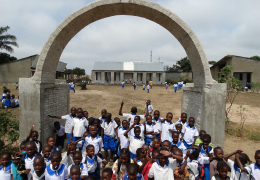
While we of course create a bridge to middle school education, we are also proactively introducing practical education that will link to work after graduation for those students who complete only primary education in areas such as chalk and clothing making.
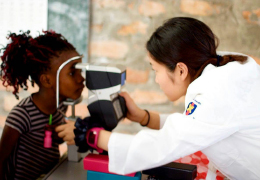
At ACADEX Elementary School, we are also promoting relationship building by giving consideration to the health and hygiene of students through medical examinations, for example, in collaboration with the Study Group on Medicine in Africa, which was jointly established by the School of Medicine and the Faculty of Nursing and Medical Care of Keio University.
On Kuchinoerabu, an isolated island of around 130 residents in Kagoshima Prefecture, we are conducting the Elove Project. It involves initiatives to generate employment and increase social exchange with the outside in collaboration with the residents and local government. Like the Acadex Project, its true meaning is to bring together people of different dialects/languages and cultures – islanders and urban dwellers in this case – in collaboration to deepen mutual understanding and return the benefits to the local community.
On Kuchinoerabu, an educational environment already exists where the entire island is regarded as one school and the people living there are all teachers. This is a precious value that we want everyone on the island and people living off the island, in cities, for example, to know about. This will not only bring new visitors to Kuchinoerabu Island, but also generate know-how from the island that will benefit the city.
As part of research related to establishing an education and training business model, educational training was launched among high school students in 2012. City-based students are invited to the island to live in the community, where ways of changing the values of the island and ways to provide sustainable support are tested and verified in practice. A number of project members are also living long-term on the island, where they are striving to improve intercultural communication under the auspices of the project.
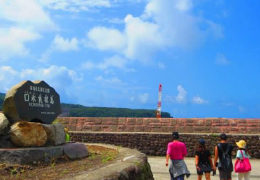
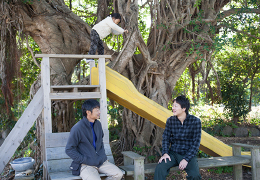
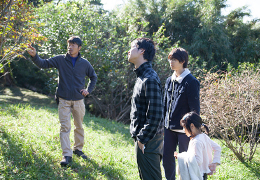
The origins of the Congo Acadex Project and the Elove Project lie in our earliest initiative, which was the New York Project. This was an English learning workshop which we offered in line with the sister city exchange program between New York and Tokyo.
The program began in 2006 and is currently running at two junior high schools in Tokyo as an after school English activity. The students learn the basics of English in class at school, and we replace that with a communication perspective. Specifically, it involves a mix of ice-breakers and English games, and creation by students in line with the themes of the sister city exchange program. Through this practical activity, we are researching changes in the way students approach their study of English and the process of how communication is formed.
In the course of the New York Project, I personally became aware of just how important it is to create relationships such as collaboration between people and with the community. This is what led to the projects in DR Congo and Kuchinoerabu Island, and that is why the New York Project remains the key platform of my research activities, which is absolutely indispensable.
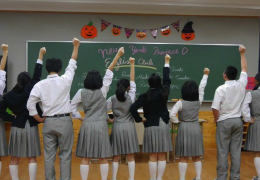
The Young Americans, an NPO organization, conducts the Music Outreach Program, in which they provide song and dance workshops to children and create a show together. Focusing on this as the ultimate example of interlinguistic and intercultural communication, our Young Americans Project investigates the potential for enhancing communication skills through performance education and broadening the reach of the program.
In DR Congo, where we have established relationships through the Congo Acadex Project., we use Mikiko Iwasaki’s Systematic Japanese (MISJ) teaching method in the Japanese Project. Our objective for this project is teaching Japanese and thereby creating intercultural exchange and promoting Japanese culture.
The five projects above are all fully fledged initiatives to establish sustainable relationships through interlinguistic and intercultural communication. It is up to our students involved in research to decide for themselves which to focus on.
Field work is the main focus of our research, the cast-iron rule of which is, “have a field site.” So rather than working to confirm a pre-determined conclusion, I want the students to fully engage in the project by interacting with people as if they are staking their own lives. This experience will surely be a powerful means to build a strong mental core after they graduate.
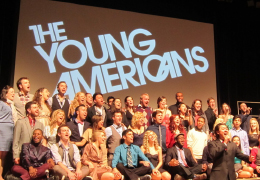
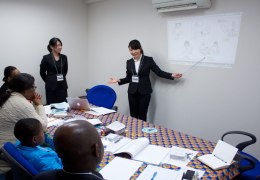
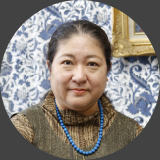
Yoko Hasebe
Associate Professor, Faculty of Environment and Information Studies, Keio University. Completed Master’s Program at Keio University Graduate School of Media and Governance. Specializes in education through English teaching materials, methods, curriculum design, teachers’ training, inter-linguistic and intercultural communication based on social psychology. In 2007, started “Primary School Project” in Democratic Republic of Congo through intercultural collaboration, has continuously introduced how to create an atmosphere for “mutual collaboration” and “sustainable relationship” with the local community, and is always working with young researchers on the fieldwork-based approach in exploring how to interpret social and cultural phenomena in local communities to develop a model school for the area. Other related projects are: “Kuchinoerabu” remote island project, New York project(inter-linguistic and intercultural program for junior high schools), Japanese project, the Young Americans project.
(Japanese Only)http://haselab.sfc.keio.ac.jp/

2015.Mar ISSUE